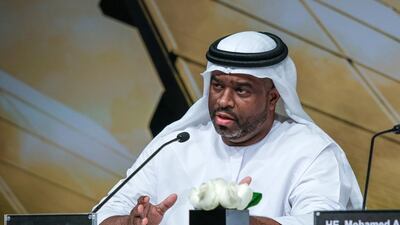Bids for the upcoming 350 megawatt solar project in Abu Dhabi’s Sweihan could match the record-low prices or come even lower than the one announced in Dubai on Monday, industry experts said.
The third phase of Dubai’s Mohammed bin Rashid Al Maktoum solar park set a new benchmark for the industry at 2.99 US cents a kilowatt-hour.
Abu Dhabi’s Masdar and its partners Fotowatio Renewable Ventures (FRV) and Gransolar Group won the contract to build the 800MW plant.
Since a Masdar-led consortium submitted such a low bid, it’s possible for a lower bid for the Sweihan project, which is due to come online in 2019. It will be capable of producing enough electricity to power more than 50,000 homes in the capital.
“The nature of bids is specific,” said Bader Al Lamki, the director of clean energy at Masdar. “If similar parameters are available, there will be a good probability that the [Dubai] number is achieved.”
Those factors include the type of land, visibility and financing. Sources close to the Abu Dhabi project say that the land is flat, unlike the rolling hills of the Dewa mega-solar park. This would indicate an easier installation with better visibility – driving down costs.
The other important factor, particularly for low-cost financing, is the credit rating. Credit ratings agencies have assigned a high AA rating to Abu Dhabi.
“It will be hard to justify why Abu Dhabi would be more expensive than Dubai because the off-taker has an equally solid rating and there is little difference in terms of capital and operational expenditures,” said Frank Wouters, a former director of Masdar Clean Energy.
“The other thing is the cost of financing. I don’t think there’s been a major change in the cost of borrowing and Masdar will be able to tap into international banking relationships through Mubadala – and costs are still low.”
Nathan Weatherstone, the head of sustainable business at NBAD, said that in the solar PV sector, up-sizing projects has allowed economies of scale to drive down solar panel costs and cyclically low commodity prices have helped to minimise the costs that make up the balance of plant.
“Other drivers have also been important, such as the availability of low cost, long tenor capital and the emergence of an ultra-competitive market of regional clean energy developers. Based on these parameters, it is entirely reasonable to think that the UAE’s next large scale PV project will continue the trend of ever-decreasing tariffs,” Mr Weatherstone said.
The advisers for the bid were chosen in March, with Akin Gump Strauss Hauer & Feld selected to handle legal, Alderbrook Finance taking on finance and Fichtner Consulting Engineering as the technical adviser.
Bids were supposed to be submitted next month with the shortlisted contenders expected in September, but sources said that it had been pushed back at the request of companies.
Jenny Chase, a solar analyst for Bloomberg New Energy Finance, said that she did not predict much downwards flexibility in the Abu Dhabi tender pricing if it had a fundamental link to economics.
“The Dubai tender already stretches all reasonable economic assumptions,” she said, adding that the Sweihan project would likely have the same price.
“A higher price is unlikely to be politically acceptable and a lower price just encourages the race to the bottom,” Ms Chase said.
lgraves@thenational.ae
Follow The National's Business section on Twitter

